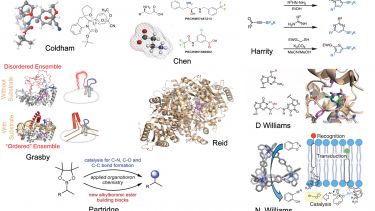Chemical Biology
Chemical biology is a multidisciplinary research area at the interface between chemistry and biology.

Our research employs chemical techniques and synthetic, biologically active small molecules, peptides, nucleic acids and polymers to understand and affect biological processes.
Major research themes include:
- Synthetic and medicinal Chemistry: Development of novel methodology and catalysts for the synthesis of biologically active molecules and understanding mechanisms of chemical reactions
- Rational drug design and synthesis of small molecules for treatment of antimicrobial resistance, motor neuron diseases and cancer treatment.
- Nucleic acid chemistry: Synthesis of modified DNA structures containing DNA damage, hybrid nanoparticles comprised of nucleic acid aptamer-molecularly-imprinted-polymers (MIPs) for molecular recognition.
- Peptide chemistry: Development of methods for synthesis of biologically active beta-amino acid containing peptides and peptidomimetics.
- Diagnostics and therapeutics: Development of luminescent coordination complexes for diagnostics and therapeutics, creating recognition controlled responsive vesicles/liposomes and molecularly imprinted polymers (MIPs) as biosensors.
- Bioinspired chemistry that seeks to develop biomimetic catalysts
- Understanding protein self-interactions in biology and therapeutics using protein design and the use of dendrimers to block protein-protein interactions.
- Mechanistic biology: Understanding the function of proteins involved in DNA replication and repair, RNA transcription, nucleic-acid sensing and porphyrin biosynthesis.
Methods
- Synthetic organic and medicinal chemistry
- Physical organic chemistry and computational chemistry
- DNA synthesis and peptide synthesis
- Protein expression and purification
- CD and fluorescence spectroscopy
- Hydrodynamic measurements (dynamic light scattering, AF4, SEC-MALLS)
- Molecular modelling and virtual screening
- Stopped flow and quench flow – for kinetic measurements and enzymology
Members
- Dr David M. Williams (cluster lead)
- Dr Barbara Ciani
- Prof. Beining Chen
- Prof. Jane A. Grasby
- Prof. Joseph P.A. Harrity
- Dr Benjamin M. Partridge
- Dr Jim Reid
- Dr Fadi Soukarieh
- Prof. Jim A. Thomas
- Prof. Nick Turner
- Dr Lance J. Twyman
- Prof. Nicholas H. Williams
Emeritus
Research facilities
Our work in antimicrobial resistance links with research in the Florey Institute of Infection
Our work in mechanistic biology links with research in the Nucleic Acids Institute
Our work on photodynamic therapy links with research in the School of Medicine and Population Health
Our work in motor neuron disease (MND) will involve collaboration with SiTraN Sheffield Institute for Translational Neuroscience
Our work in antimicrobial resistance and therapeutics links to the Wolsfon Light Microscopy Facility
Companies
Jim Thomas was co-founder and currently chief scientific advisor of a company founded in 2021 exploiting ruthenium-based compounds to tackle antimicrobial resistance.
